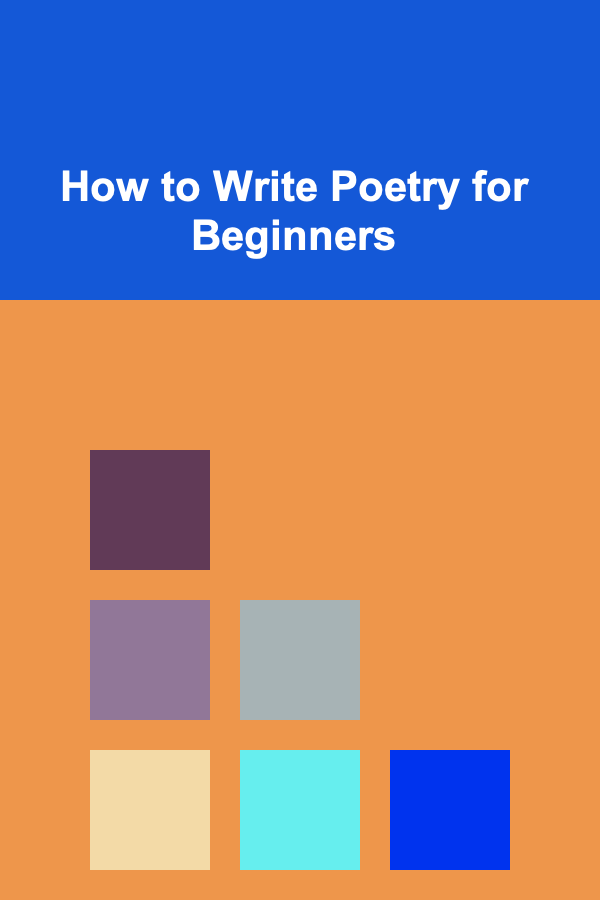
How to Write Poetry for Beginners
ebook include PDF & Audio bundle (Micro Guide)
$12.99$6.99
Limited Time Offer! Order within the next:

Writing poetry is an ancient and beautiful form of self-expression, allowing individuals to explore and communicate deep emotions, stories, and ideas through the use of language. While it can seem intimidating, especially to beginners, poetry is not about adhering to strict rules; rather, it is about creativity, imagination, and personal voice. In this article, we will explore the key elements of poetry and provide a beginner-friendly guide on how to start writing poems.
The Nature of Poetry
Poetry is an art form that combines words, rhythm, and emotion to create something unique. It is often concise, but powerful, using specific language to evoke images, feelings, and thoughts in the reader. Unlike prose, which typically conveys its meaning through straightforward narrative, poetry often relies on metaphor, symbolism, and other literary devices to convey deeper meaning and create emotional resonance.
For beginners, the most important aspect of poetry is not the technicalities, but the experience of writing and the ability to convey personal thoughts in a creative way.
Common Myths about Poetry
Before diving into the actual writing process, let's address a few common myths about poetry that might discourage beginners:
1. Poetry is only for experts
Many people believe that only highly trained poets can write poetry. This is simply not true. Anyone can write poetry, regardless of their experience or background. Poetry is a deeply personal form of expression, and there are no strict rules about who can or cannot write it.
2. Poetry needs to rhyme
Rhyming is just one tool that poets use, but it is not a requirement. Modern poetry, in particular, tends to focus more on imagery, emotion, and meaning rather than adhering to rhyme schemes. Free verse, a form of poetry that doesn't follow a set rhyme or meter, has become very popular in contemporary poetry.
3. Poetry must be difficult to understand
While some poetry is complex and layered with meaning, not all poetry is intended to be obscure. In fact, some of the most moving poems are simple, clear, and direct. As a beginner, you don't need to write cryptic poetry to be successful. Focus on expressing your thoughts and feelings authentically.
4. Poetry is a solitary activity
While writing poetry often happens alone, the writing process can be shared and enriched through feedback from others. Many poets work within writing groups, collaborate with other artists, or share their poems in workshops to receive constructive criticism and improve their craft.
Key Elements of Poetry
Understanding the key elements of poetry will help you to create your own work. These elements guide poets in shaping their ideas and emotions into cohesive, impactful pieces.
1. Imagery
Imagery refers to the use of descriptive language that appeals to the senses (sight, sound, touch, taste, smell). The goal of imagery is to create vivid pictures in the reader's mind, making the poem more engaging and evocative. For example, instead of saying "the flower is beautiful," you might describe it as "a soft pink blossom swaying in the gentle breeze, its petals glistening with morning dew." The use of specific details helps the reader experience the poem on a deeper level.
2. Metaphor and Simile
Metaphors and similes are comparisons used in poetry to create meaning or add depth. A metaphor compares two unlike things directly, while a simile uses "like" or "as" to make the comparison.
- Metaphor: "Time is a thief."
- Simile: "Her smile was like sunshine on a rainy day."
These comparisons help poets to explain complex emotions or situations in an accessible, imaginative way.
3. Sound and Rhythm
The sound and rhythm of a poem are crucial for creating a musical quality. This can be achieved through elements like rhyme , alliteration , assonance , and consonance.
- Alliteration is the repetition of the same consonant sound at the beginning of words (e.g., "Peter Piper picked a peck of pickled peppers").
- Assonance is the repetition of vowel sounds within words (e.g., "The rain in Spain falls mainly on the plain").
- Consonance refers to the repetition of consonant sounds (e.g., "The lumpy bumpy road").
You can also play with the meter, or the pattern of stressed and unstressed syllables in a line, to create a rhythm that adds to the mood of the poem.
4. Theme
Every poem has a theme, or a central idea. The theme can be anything --- love, nature, loss, identity, hope, or even something abstract like time or dreams. The theme serves as the backbone of the poem and influences its tone, language, and structure. Identifying the theme of your poem will help you focus on the message you want to convey.
5. Tone and Mood
The tone refers to the attitude the poet has toward the subject or the reader. It can be serious, playful, angry, or hopeful. The mood refers to the emotional atmosphere the poem creates, which is often affected by the tone and imagery.
Both tone and mood are important to setting the emotional landscape of your poem. A well-crafted poem can evoke powerful emotions in the reader by establishing the right tone and mood.
6. Line Breaks and Stanzas
The way you break your poem into lines and stanzas plays a significant role in how the poem is read and understood. Line breaks can emphasize certain words or phrases and create pauses that add meaning. Stanzas group related ideas together and provide structure to the poem.
Poets often play with these elements to guide the reader's experience, making each poem unique. For instance, short lines might create a sense of urgency, while longer lines can slow down the reading process, allowing for more contemplation.
Tips for Beginners
Now that you understand the key elements of poetry, it's time to start writing. Here are some tips for beginners to get started with poetry:
1. Write What You Feel
Poetry is an excellent way to express your emotions, thoughts, and experiences. When starting out, focus on writing about what is most important to you or what you are feeling in the moment. Whether you're writing about love, joy, grief, or confusion, writing from the heart will help you develop an authentic poetic voice.
2. Read Other Poetry
Reading the work of established poets is one of the best ways to improve your own writing. Pay attention to how poets use imagery, structure, and language. Notice how they convey emotions and how the poem flows. Some poets whose work is widely appreciated include Emily Dickinson, Robert Frost, Langston Hughes, Maya Angelou, and Pablo Neruda. Contemporary poets like Rupi Kaur and Warsan Shire also provide modern examples of accessible poetry.
3. Experiment with Different Forms
Poetry comes in many forms. While free verse allows for freedom and creativity, traditional forms like sonnets, haikus, and limericks offer structure that can help beginners focus their ideas. Experimenting with different poetic forms can help you develop your writing skills and discover what works best for you.
- Sonnets: 14-line poems, usually written in iambic pentameter.
- Haikus: Traditional Japanese poems with a 5-7-5 syllable pattern.
- Limericks: Humorous five-line poems with an AABBA rhyme scheme.
Don't be afraid to experiment, as trying new forms can spark creativity and help you think outside the box.
4. Keep a Poetry Journal
One of the best ways to develop as a poet is by writing regularly. Keep a journal where you can jot down ideas, thoughts, or observations. This journal will be a source of inspiration for future poems. Sometimes, even a single line or image can lead to a complete poem.
5. Focus on the Sound
As you write, pay attention to the sound of your words. Read your poem out loud to hear how it flows. Listen for the rhythm, rhyme, and alliteration. The way the words sound is just as important as what they mean. Poets use sound to enhance the emotional impact of their poems, so don't overlook this aspect of your writing.
6. Be Patient with Yourself
Writing poetry is a process, and it may take time to find your voice. Don't worry if your first few poems don't come out the way you envision them. The more you practice, the better you will become. Don't be afraid to revise your poems, experiment with different ideas, and learn from other writers.
7. Get Feedback
Sharing your poetry with others can be intimidating, but it's also a great way to grow as a poet. Join writing groups, attend poetry workshops, or share your work with friends and family. Constructive feedback will help you refine your poems and gain new perspectives.
8. Don't Overthink It
One of the joys of writing poetry is that it allows for creativity and spontaneity. Don't overthink every word or try to follow too many rules. Let your thoughts and emotions flow naturally. Sometimes the best poems come from moments of intuition and raw feeling.
Conclusion
Writing poetry is an exciting and fulfilling journey, and anyone can start regardless of experience or background. By understanding the key elements of poetry, practicing regularly, and embracing your creativity, you'll develop your unique poetic voice. Whether you choose to write free verse, experiment with traditional forms, or simply express your emotions through words, poetry offers endless opportunities for self-expression.
So, pick up your pen, embrace the process, and start writing. You might be surprised at how much you enjoy it.
Reading More From Our Other Websites
- [Home Security 101] How to Prevent Home Burglaries During the Holiday Season
- [Home Soundproofing 101] How to Soundproof a Drum Room for Serious Musicians
- [Horseback Riding Tip 101] Key Safety Practices and Riding Etiquette: Foundations of Confident Horse Riding
- [Digital Decluttering Tip 101] Signal vs. Noise: Curating Content to Preserve Focus in the Age of Information Overload
- [Personal Investment 101] How to Manage Risk in Personal Investments: Strategies for Success
- [Home Staging 101] How to Arrange Furniture for Maximum Appeal
- [Home Family Activity 101] How to Make Family Time Special with Creative Dinner Themes
- [Organization Tip 101] How to Create an Efficient Sewing Room Layout
- [Skydiving Tip 101] The Golden Age of Freefall: How !(^)S Culture Shaped Modern Skydiving
- [Home Security 101] How to Use Remote Access to Monitor and Control Your Home Security System

How to Create a Checklist for Encouraging Member Participation
Read More
How to Create a Spice Drawer That Works for You
Read More
How to Implement a Cleaning Schedule for Your Home
Read More
How to Set Up an Automatic Savings Plan for Easy Growth
Read More
How to Use Financial Planning to Improve Your Mental Well-Being
Read More
How To Develop a Yoga Sequence for Detoxification
Read MoreOther Products

How to Create a Checklist for Encouraging Member Participation
Read More
How to Create a Spice Drawer That Works for You
Read More
How to Implement a Cleaning Schedule for Your Home
Read More
How to Set Up an Automatic Savings Plan for Easy Growth
Read More
How to Use Financial Planning to Improve Your Mental Well-Being
Read More